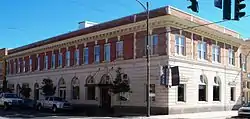First Guaranty Bank
First Guaranty Bank (FGB) is a bank based in Hammond, Louisiana. It is the primary subsidiary of First Guaranty Bancshares, Inc., a bank holding company. The bank operates 21 branches.[1]
| Type | Public company |
|---|---|
| NASDAQ: FGBI Russell 2000 Index component | |
| Industry | Banking |
| Founded | 1934 |
| Headquarters | Hammond, Louisiana |
Area served | Louisiana |
Key people | Marshall T. Reynolds, Chairman Alton B. Lewis, CEO & President Eric J. Dosch, CFO |
| Total assets | |
| Total equity | |
Number of employees | 349 (2017) |
| Website | www |
| Footnotes / references [1] | |


History
The bank was founded in Hammond, Louisiana in 1934 as Guaranty Bank & Trust Company.[2]
In 1971, the bank was renamed First Guaranty Bank.[2]
In 1999, the bank acquired 13 branches from Bank One.[3]
In 2007, the company acquired Homestead Bancorp, Inc. for $13 million in cash.[4][5] It also acquired Douglass National Bank of Kansas City.[6]
On September 22, 2011, the bank exited its participation in the Troubled Asset Relief Program by repurchasing securities from the United States Treasury for $21.1 million.[1]
In 2017, the company acquired Premier Bancshares for $21 million in cash and stock.[7]
In August 2019, the bank's holding company entered into a deal to purchase the holding company of The Union Bank of Marksville, Louisiana for $43 million. When completed late in 2019, the acquisition will increase the bank's number of branches by about 50% to around 30.[8]
Allegation of racial discrimination
In 2019, Nikole Hannah-Jones, in a New York Times podcast, asserted that the bank discriminated against two African-American farmers, June and Angie Provost. According to the reporting, the bank is alleged to have engaged in fraud by changing loan amounts and forging the signatures of the applicants. This had the intended effect of putting financial pressure on the Provosts and eventually led them to lose their farm and their home to foreclosure. The case is now the subject of litigation and a federal USDA whistle-blower complaint.[9] The bank denied these allegations, saying that they are "completely unfounded and frivolous", also stating that it "has not and does not engage in discriminatory practices". [10]
References
- "First Guaranty Bancshares, Inc. 2017 Form 10-K Annual Report". U.S. Securities and Exchange Commission.
- "Institution History for FIRST GUARANTY BANK (422433)". Federal Financial Institutions Examination Council.
- Andrejczak, Matt (July 15, 1999). "La.'s First Guaranty to Buy 13 Bank One Branches". American Banker.(subscription required)
- "First Guaranty Bank Enters into a Definitive Agreement to Acquire Homestead Bancorp, Inc" (Press release). Business Wire. January 5, 2007.
- Mullins, Luke (January 8, 2007). "In Brief: La.'s First Guaranty Buying Homestead". American Banker.(subscription required)
- "Douglass agrees to sell to Louisiana company". American City Business Journals. August 7, 2007.
- Prior, Jon (October 7, 2004). "Louisiana bank acquires McKinney-based parent of Synergy Bank". American City Business Journals.
- Mosbrucker, Kristen (August 6, 2019). "First Guaranty Bancshares to acquire Marksville bank Union Bancshares for $43M". The Advocate. Baton Rouge. Retrieved October 14, 2019.
- "Episode 5: The Land of Our Fathers, Part 2". The New York Times. 2019-10-11. ISSN 0362-4331. Retrieved 2019-10-14.
- Weingarten, Debbie (October 30, 2018). "'It's not fair, not right': how America treats its black farmers: Sugarcanes farmers can't survive without large crop loans. For the Provosts, who say they suffered decades of discrimination, this could be the end of the line". The Guardian.
External links
- Business data for First Guaranty Bancshares, Inc.: